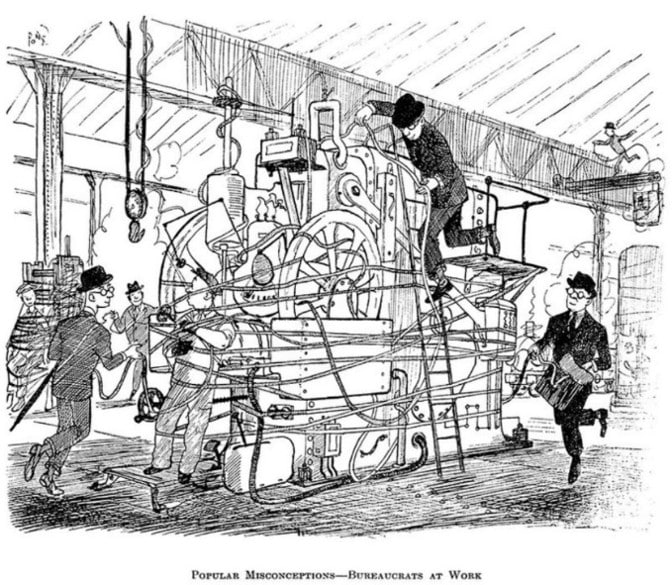
What’s going on with the church? How has it become an institution that provides services? How is it weathering the cultural move from Christianity to secularism and beyond? Is there anything I can say as an engineer to speak into the movement of the church I love?
Modernity is seen as the continuous development of Western culture from the Renaissance through Globalization. It is characterized by a move to secularism, a scientific worldview, industrialization, and belief in progress. Modernity focused on improvement in the standard of living and scientific advances to create wealth and the modern way of living. This move distorted our long held Christian ethics and values. We became less dependent on the common consensus of a Christian culture upon which modernity was implicitly built. As modernity turned its critical insights and methods, once used to reject Christianity, onto modernity itself, it lacked a foundation or method for knowing good or truth. Efforts to move beyond the rationalism and secularism of modernity birthed post-modernism. I see culture today in a move beyond postmodernism to something else.
No matter where the spirit of the age wanders, the church strives to live and teach the centrality of Jesus as the Christ and His kingdom that goes beyond conversion to discipleship. Jesus calls us as disciples who are characterized by love.
At the height of modernity, businesses benefitted dramatically from the insights of Peter Drucker. His methods were essential in large organizations to accomplish big things. This necessitated a move away from smaller communities where people worked together with personal relationships to collaborate for the goals they shared. Large working groups became institutions with each individual contributing to a hierarchical structure that in many cases was dehumanizing. Individuals were often treated as assets or resources and not as people made in the image of God. Obviously, none of this negativity inherent to institutionalization was intentional. In fact, effective organizations continued to have a culture of collaboration and innovation.
Despite the adoption of an institutional structure, every large organization that remained effective had a community of cooperation that survived alongside and often outside of the official structure. In most large organizations that are functional, there remains an informal collaboration among a community of people across all roles to get things done.
Like corporations, healthy churches form a community that collaborates, has expectations and encourages engagement and commitment. Making disciples is not primarily a training or teaching effort, not mainly a skill, but happens as converts adopt and try to meet the expectations of their Christian community.
I grew up in communities like church, school, companies, etc. I was expected to contribute and share the work and resources for our common goals. My children have grown up in a less community-centric culture and spent much of their time in institutions that provided programs and resources to utilize.
I learned to swim in the lake when I was 5 from another kid that was 8. My kids learned to swim at the YMCA. I swam to go somewhere, they did it for fun and exercise. My grandkids think of swimming as an activity that is provided by an institution. I pay you and you let me swim. This is a transaction – not a community event. Swimming is like going to a movie theater, I pay and get the service. Unfortunately, as churches become more like institutions, the same transactional idea applies to church membership. Members get benefits, but the transaction comes absent a disciple’s engagement in community.
For better and for worse, much of the institutionalization of our age is the product of the insights of Drucker. Far less known is that Drucker also mentored many of the leaders in evangelicalism, leading them to focus on results just as corporations do. His intentions were to help the church change the world for good. He brought his organizational ideas to leaders, but it seems in business as well as within the church, at some point you pass the point of no return. A formal, rigid, organization of individuals overshadows the nimble, informal, collaboration of a community. In church, this is characteristic of having members who are not becoming disciples and the church seen as an organization and not as my community.
Many churches at their core are have an institutional organization and are saddled with the weaknesses that come with being an institution. The expected institutional conformity and disengagement of attendees in many churches is like that of the workplace in many large corporations. The complex structure of a church run as an institution unwittingly creates barriers that hamper individuals in the pew from having or building community with one another.
The response to this breakdown of community by many who were raised in the church is to reject the faith of their fathers. What are they being offered? Disciples are characterized by sacrificial love one to another within a caring community. Our young people and elders alike are not seeing, experiencing, nor sharing this kind of love. Love is the primary feature of followers of Jesus. Why is love for one another not core to our church community’s expectations of ourselves and others?
Enter Elon Musk, another visionary with possible insights from which the church can glean. Like industrial revolutionaries before him– John D. Rockefeller, Andrew Carnegie, Kelly Johnson, J.P. Morgan– Musk with his insights into how to create a culture of accountability, autonomy, innovation and collaboration has succeeded at SpaceX. This has dramatically improved the technology and capability of space flight. As someone deeply involved in manufacturing, Musk’s organizational values and practices resonate with me as they enable people to meet high expectations and perform in ways uncommon in typical institutions of manufacturing. People within the organization are enabled, encouraged, and expected to innovate and improve. The ability to create a culture that allows individuals the freedom to innovate in a community that has high expectations for their contribution and expects their collaboration is essential.
Musk claims to be a cultural Christian. He asserts that he believes in Jesus’ teachings. It is ironic and challenging that he believes Christians are not willing to stand up for and live out their Christianity.
“Christianity has become toothless.”
“Unless there is more bravery to stand up for what is fair and right, Christianity will perish.”
“I believe in the principles of Christianity like love thy neighbor as thyself (have empathy for all) and turn the other cheek (end the cycle of retribution).” Elon Musk
I do not think Musk is a committed Christian who is theologically astute, but he is wise and capable in manufacturing. His revitalization of organizational performance, values, and practices resonate with core but neglected Christian values. Using Musk as a contemporary secular innovator of corporate effectiveness in de-institutionalizing his businesses, gives us a way of thinking about how we could move forward in the church as well. This does not mean that his insights are all correct or applicable to the church but that many of them seem to be directed at fundamental issues we need to address.
Evaluating Musk’s approach to his community with the Scripture allows us to think through how churches can engage with the younger generation of believers to demonstrate that being and realizing the kingdom is precisely what’s missing in churches. And this is far more critical than going to Mars.
If we want to reach our next generation, we need to regain the real good news – the one that has always said that living the Christian life is the very purpose and meaning of life. Being moral is not my own journey to some level of virtue but rather loving my neighbor is the journey we are all on together.
